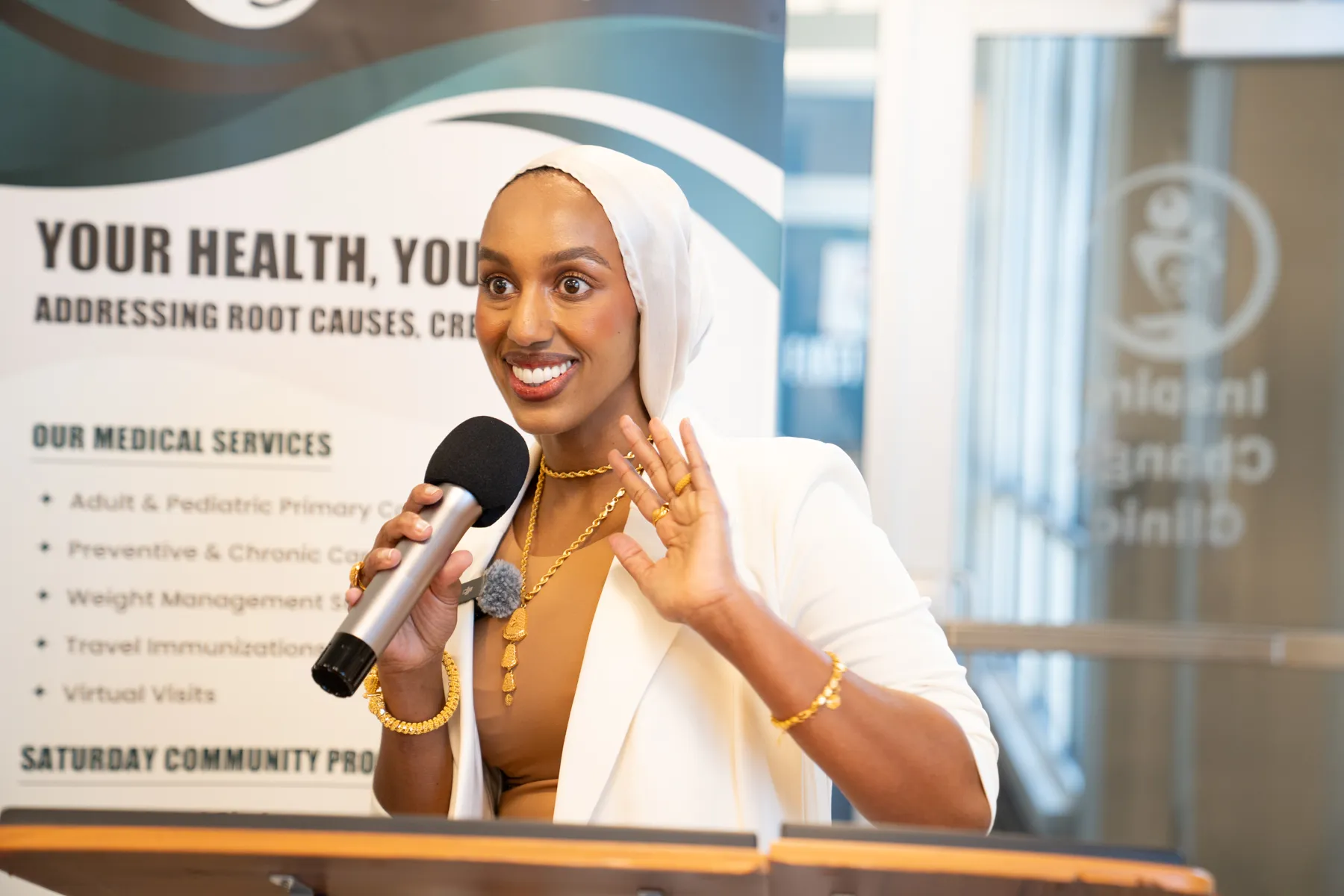Munira Maalimisaq, the founder of Inspire Change Clinic, is seen on Oct. 27, 2025, at the clinic’s open house in south Minneapolis. Credit: Dymanh Chhoun | Sahan Journal
Munira Maalimisaq has seen firsthand the disparities that immigrants face in the health care system.
As a nurse practitioner who has worked in health care for more than a decade, she has seen that some patients of color weren’t having their needs met. Inaccurate translations led to confusion about medical care. Rushed doctor’s appointments left community members not feeling valued.
Munira came to the United States from Somalia when she was a child. She was instructed to take daily medication for latent tuberculosis. But no one took the time to explain to her what the medication was for.
“I thought it was a pill that I needed to take to be in the States,” she said.
Those experiences led her to create Inspire Change Clinic, which aims to provide culturally responsive care to community members in a diverse corridor of the city.
”The system is broken, and we need to figure out how to build trust with our patients, but in a way that makes them feel safe and not transactional,” she said.
Inspire Change Clinic launched in late October in the Ventura Village neighborhood, which borders the Elliott Park, Cedar-Riverside and Phillips neighborhoods. The area is home to Black, Latino and Native residents.
Starting a new clinic
Opening Inspire Change has been years in the making for Munira.
For the past two years, the clinic has been partnering with larger clinics, such as Children’s Minnesota, for training and research. It has also hosted programming for community members.
For example, the clinic created a motherhood circle for Somali moms to discuss their experiences and topics like breastfeeding. The clinic has worked to train providers to talk with patients about vaccine hesitancy in the Somali community. Munira also helped advocate for a new Islamic religious ruling, called a fatwa, that allows Muslims to use donor breastmilk to feed premature babies when needed.
Children’s Minnesota worked with Inspire Change on initiatives like the fatwa and the motherhood circle, and provided some funding to Inspire Change.
“Leaders like Munira help us really understand more around the community context that results in the health disparities and health inequities that we see in our communities and in our healthcare overall in Minnesota,” said Lauren Gilchrist, senior director of the Collective for Community Health at Children’s.
While the clinic was years in the planning, it is launching against a backdrop of sharp federal cuts to Medicaid and other programs serving low-income communities. The Minnesota Legislature passed a budget in June stripping access to MinnesotaCare for adults without legal status. The changes will affect providers from major hospital systems to community clinics, leading patients to put off preventative care and providers to cut hours and staff.
While Munira said that is a concern, she said she’s committed to finding a sustainable path for her clinic, and serving the community.
“This is a crazy time,” she said. “But I’m one of those people, like I see this vision, this is a need.”
Munira said she’s been saving funding from partnerships over the years, which has allowed her to raise enough money to open the clinic for primary care services.
Federal cuts to programs like Medicare and Medicaid are expected to impact clinics and patients alike. Ezra Golberstein, a professor at the University of Minnesota’s School of Public Health, said the cuts are unprecedented.
“For parts of the health care delivery system that disproportionately serve Medicaid beneficiaries, it’s going to put them in a very, very difficult situation,” he said.
Munira said about 40% of the clinic’s patients have private insurance. The rest are either on programs like Medicaid or are uninsured.
To help offset increasing health care costs for patients, Munira said the clinic hopes to offer a sliding scale for patients to pay their bills. She said the clinic is also exploring a model that would allow patients to make smaller monthly payments.
As a new clinic, Inspire Change is not yet federally qualified, meaning it won’t be reimbursed as much as other clinics for services, especially for Medicaid patients. It takes time to become federally qualified, Munira said.
Munira said some providers coming to work at the clinic had to take a pay cut from their previous jobs. However, she said her staff were willing to do so, and are passionate about the work and want to help the community.
Community members and private donors also chipped in by donating furniture like chairs and beds.
“It’s a community effort,” Munira said.
Services provided
Following its October launch, the clinic will begin providing primary care, as well as services like chronic care management and nutrition. It will also continue to hold community meetings and provide resources, such as the Somali motherhood circle. A similar group for Spanish-speaking moms will also begin to meet. The clinic also provides day care for patients during their appointments and will provide other resources like a food pantry.
The clinic’s staff speak multiple languages, including Somali, Spanish and Oromo. About 10 people are on staff, including two doctors, nurse practitioners and a nurse.
Partners will also bring some services to the clinic, such as mobile dental care and a mammogram truck.
Munira said she doesn’t want to limit the time doctors can spend with patients during appointments, which can cause patients, especially those of color, to not feel like they are being heard or could leave them with unanswered questions. Typically patients only see their doctor for about 20 minutes, she said.
“It’s really important … that you feel like your symptoms and your lived experience matters,” Munira said.
Munira said she hoped to have about 100 patients in the first year. But within two weeks of opening up appointment requests, about 400 people signed up.
Jackie Johnson is a nurse practitioner specializing in women’s health who will be working at the clinic. She said she tries to make women, especially women of color, comfortable during an appointment that can feel personal and vulnerable. Procedures like cervical cancer screenings and pelvic exams can be invasive. She wants patients to feel in control during the exam.
She said she also works with the patient to determine what is the best course of action for them.
“It’s their bodies, they know more about their body than I do,” she said. “I’m here to serve them.”
Najma Dahir, program director for the clinic, also emphasized that patients at the clinic have agency over their own health, and are seen as equals, which is not always a typical experience in other clinic settings.
“As somebody who works here, I feel like I matter,” she said. “I feel like whatever I say actually holds value.”














